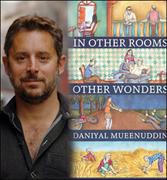In Other Rooms, Other Wonders
By Daniyal Mueenuddin
248 pp. Random House, India
Indian Rs395
ISBN 978 81 8400 035 1
In Daniyal Mueenuddin’s collection of eight short stories, the mesmerising elements of a compelling narrative are all poised perfectly, thus, truly justifying it as a Pulitzer Prize Finalist. Underneath the narrator’s entirely stoic objectivity, readers experience some truly emotional moments. Diction’s immaculately plain and unruffled, and it is through this perspicuous expression that he dissects the societal nuances of Pakistan in all its integrality and failings.
The eight interwoven stories are arranged around the ailing landlord K.K. Harouni; his vast lands in Dunyapur and his huge mansion in the throbbing metropolis of Lahore; his kinsfolk; his servants and managers.
Mueenuddin’s characterization of the influential Harounis, Talwanis, Jaglanis and the remaining dominating gentry is virtuously incisive. All his characters take chances; almost all are opportunistic; from the likes of Nawabdin Electrician to the ones in the ruling class. They all rule and gamble in their own dominions. But his women characters from the lower strata are not only weak but they all meet a despairing end. Husna, Saleema and Zainab all thrive to ascend a little in the patriarchal world through physically pleasing their respective lovers, who at the end leave these women with neither any names nor any security.
The stories represent the diversified social cluster of Pakistan and embody the peculiar theme of manipulation, undisputed class supremacy and iniquity. In stories like, Saleema; Provide, Provide; In Other Rooms, Other Wonders and A Spoiled Man, he subtlety gives a penetrative view about the servants’ hierarchy that how they control their domains and slyly manage to draw their undue share from the excessive wealth of their master. A Burning Girl is a lamentable tale narrated remorselessly by a Lahore High Court’s session Judge that how he no longer believes in law to be “a sword of the Lord”. But it’s Lily and Our Lady of Paris that stand out from the rest not only because of their setting in a high class but the author’s storytelling skills are promisingly entrancing here.
For many, these stories are an honest account of the contemporary Pakistan, if, and indeed they are, then, it’s a demeaning picture and there’s nothing significantly worthy about our social setup. Moreover, the order of the stories could have been changed so as to conceal and break up the expected storyline of the few that share similarities.
The stories do cover the magnitude of the components of the introductory Punjabi proverb, “Three things for which we kill — land, women and gold.” Daniyal Mueenuddin revealed in an interview that “he’s always admired the way in which Balzac covers a wide canvas” and he has doubtlessly achieved this.
Though Mueenuddin’s genius blooms marvelously here but it’s a little too early to bracket him with Chekhov. Let’s wait and see how he spins his gripping mastery in the next set of stories, meanwhile, please yourself with a copy of In Other Rooms, Other Wonders.




